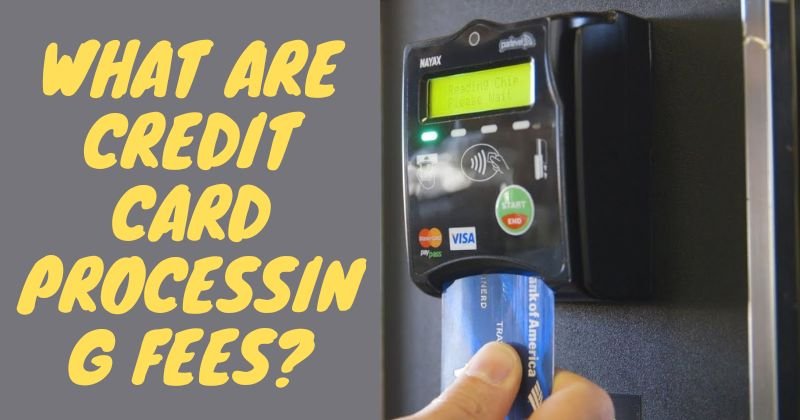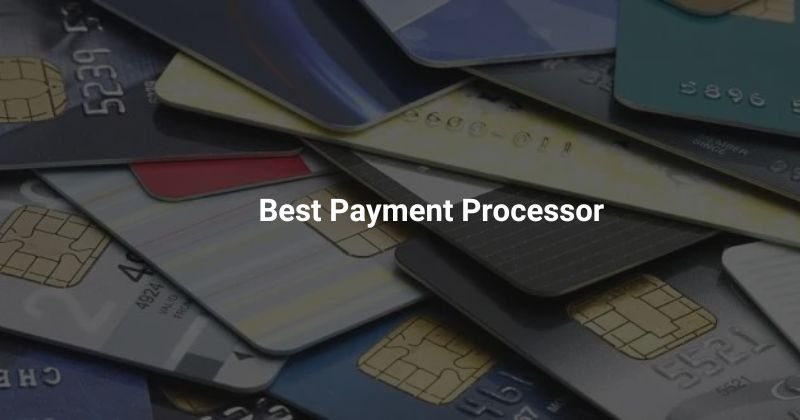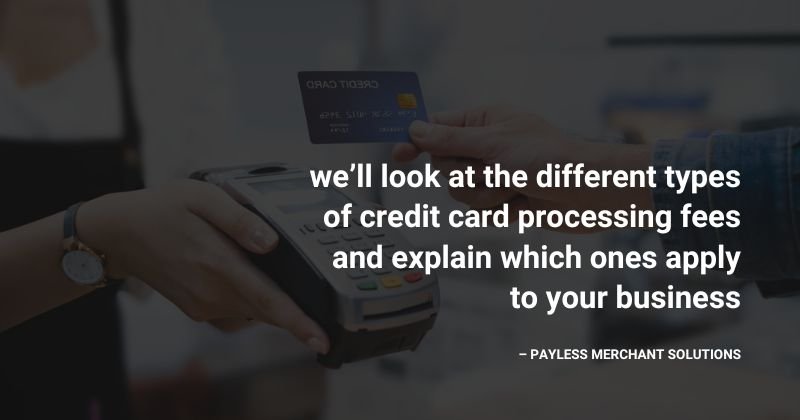What Are the Fees and Costs of Credit Card Processing?

Processing fees are one of the many costs of running a credit card company. This article will examine how processing fees will change in 2022 and what you can do to prepare.
Are you curious about credit card processing fees? How much is your business spending each month on these services? Interested in finding out which processors offer the best deals for your company? Look no further! We’ll share everything you need to know about credit card fees for merchants so that you can make informed decisions when choosing a processor.
What is a Credit Card Transaction?
A credit card transaction is a purchase made with a credit card. The customer pays for the purchase at the current time and then pays for it later. In many cases, the company doesn’t get paid unless the customer pays their bills on time.
There are two types of credit cards: revolving and installment. A revolving card is one that the customer can use up to their limit, but they must pay back any amount they have used by their next bill date. On the other hand, an installment card has a fixed amount of money that can be spent each month without paying anything back until months later when it is due.
What Types of Businesses Should Consider Implementing Credit Card Processing?
Credit card processing is necessary for all businesses, including retail, restaurants, and hotels. Whether you are in the food industry or not, credit card processing can benefit your business because it provides convenience to your customers.
There are three main types of businesses that should consider implementing credit card processing:
- Companies that sell goods or services online
- Companies that sell goods or services offline but still handle transactions online (for example, purchases made in-store).
- Businesses that need to process transactions offline (such as in person)
What Are Average Credit Card Processing Fees?

Credit card processing fees are a charge that businesses pay to banks or other processors for the service of taking credit card transactions. The fees vary depending on the type of credit card and the country where the transaction is made.
Generally, processing fees for Visa cards are higher than for Mastercard cards. This is because Visa charges a network fee plus an interchange fee, while Mastercard does not charge a network fee. Network fees are paid by the banks that process Visa transactions. They are determined by factors such as the number of cards in use and how far each card is from the network hub.
Interchange fees are a set amount charged by banks for each card purchase and are based on how much money is transferred between the bank’s account and that of the merchant.
The two most common credit card processing companies in the United States are Intuit (formerly Quicken) and PayPal. Intuit operates QuickBooks, while PayPal operates PayPal Credit and Venmo.
Types of Merchant Processing Fees
Now that you know how credit card processing fees are calculated, it’s critical to understand how to distinguish between the credit card fees that are included in these prices.
Most merchant processing charges fall into one of four categories:
- Interchange fees
- Assessment fees
- Processing fees
- Transaction fees
Interchange Fees
The bank that handles your visa card merchant levies this fee. These expenses may build up rapidly and significantly affect your budget.
There is no definitive interchange fee. Each bank charges its rates, which can vary depending on the region where the purchase was made. If you are unsure about what your bank charges, ask them directly. Alternatively, you can use an online calculator to determine the approximate interchange fee applied to your purchase.
If you plan to make a large purchase using your credit card, it is important to understand the associated costs to plan for them. The fees charged by banks can quickly add up and have a major financial impact on your budget.
Payment Processor Fees
The following is a rundown of the most typical payment processor fees:
- Processing fee
- Merchant processing fee
- Interchange fee
- Bank fee
- Cash advance fee
- Late payment fee
- Returned check fee
Some payment processors have lower processing fees, while others have higher ones. It’s important to do your research to find the payment processor with the lowest possible processing fees.
Assessment Fees
Some processors also charge a processing fee for each transaction made with the approved account. This fee is often levied when money is transferred from the bank account to the credit card business.
It’s critical to comprehend these fees and how they could affect your revenue. If you have a high volume of transactions, you may want to look for a processor that charges lower processing fees. On the other hand, if you have less frequent transactions, you may be best served using a processor that charges an assessment fee but doesn’t charge for transaction processing.
Who gets the fees?
In every credit card transaction, three parties may charge suppliers a fee.
The credit card issuer: Here is where you can find an institution that issues the card.
The issuer is generally a bank like Chase or Bank of America.
The credit card network: These companies facilitate the transaction between the issuer and the merchant. The major credit card networks are Visa, Mastercard, Discover, and American Express. All of these have their benefits and shortcomings, so it’s best to research before choosing one.
Payment processors are integral to the success of any transaction. There are many processors that suppliers can use to maximize their success.
You May Also Like: Zero Cost Processing
How to Lower Your Credit Card Processing Fees
As you can see, these rates can seriously add up. But there are ways to avoid high fees and get the most cost-effective solution for your business.
- Avoid flat-rate pricing: While flat-rate pricing may seem cheaper, it can end up being more expensive. Exchange rates can vary depending on a number of factors, including business volume and transaction type. Transacted rates may be lower due to the variability of price points, but you’ll miss out on the chance to make higher profits when using a flat rate.
- Minimize or avoid fees: read the fine print on fees. Fees for card statements and other service-related monthly maintenance fees can add up. Avoid them as much as possible, but if not, try asking that they be waived or reduced. If you lease equipment, compare the expenses to the amortization of equipment costs for a purchase.
- Opt for payment processing methods that minimize chargeback fees: Credit card chargebacks occur when a customer disputes a charge, generally by approaching the credit card company. For example, a customer might charge back an item or dispute the amount of the charge.
- If the chargeback is accepted, merchants are generally charged a chargeback fee, which can be hefty—QQuickbooks charges $25 for each. Roughly 75% of all chargebacks in 2019 and 2020 were counterfeit.
- You can minimize fraud by using card readers with chip protection and contactless methods and reducing or eliminating card-not-present transactions such as taking orders over the telephone.
Typical Costs for Credit Card Processing
Credit card processing fees are one of the costs associated with accepting cards. They can vary depending on the type of card and the payment processor used, but they are usually a percentage of the sale.
The main cost for processing a credit card transaction is the fee charged by the payment processor. This fee is typically a percentage of the total sale amount and is paid to the bank issuing the credit card.
Other costs are associated with accepting cards, such as merchant account fees and merchant technology fees. Merchant account fees are charged by the bank that issued your merchant account, and they are usually based on how much money you make each month. Merchant technology fees are charged by the payment processor and relate to the hardware or software you need to accept cards.
Overall, credit card processing fees are one of the costs of accepting cards. They can vary depending on the type of card and the payment processor used, but they are usually a percentage of the total sale amount.
How to Find the Best Payment Processor for Your Business

The payment processor you choose for your business can significantly impact how much you earn from your company. There are countless options out there for you to find and what matters most is choosing the one that best suits your needs.
Here are some tips for finding the best payment processor for your business:
- Understand what features are important to you
- Decide on what type of payment processor will suit your needs
- Understand the costs associated with different types of processors
- Consider the reputation and reliability of each processor
- Check if they have an excellent customer service team
The Benefits of Using a Payment Processor
A payment processor is a company that processes payments on behalf of a merchant. They work with various payment types, including credit cards and debit cards. Payment processors provide merchants with the following benefits:
- By keeping credit card information in a safe environment, they boost the security of transactions.
- They handle payment processing faster than businesses can.
- They impose lower transaction fees than those that merchants would incur if they handled payment processing independently.
- To lessen the likelihood that their consumers may be charged for fraudulent transactions, they provide fraud protection for their clients.
National Processing
Credit card processing fees vary depending on the country you are in. We discuss the National Processing fees that most credit card processing companies charge.
Most credit card processing companies charge National Processing fees. These charges are intended to defray the expenses of handling your transactions. The cost will increase as you execute more transactions. There are a few exceptions to this rule, though. For instance, some banks have reduced processing fees for new clients. Some banks also provide small firms with cheaper processing costs.
To prevent overspending, it is crucial to comprehend how these fees operate. It’s also crucial to remember that not all credit cards impose these charges. You must pick a credit card processing business that doesn’t charge them if you want to avoid paying them.
PayPal
One of the most common ways to pay for goods and services online is through PayPal. PayPal is a payment gateway that allows you to send and receive payments using your credit or debit card.
However, there are fees associated with using PayPal. First, there are processing fees. These fees are based on the amount of money that you are transferring. Second, there are chargeback fees if someone disputes a payment that you have made.
All these fees can add up quickly, so it is important to know them before making a payment. Understanding the costs associated with PayPal can save money and protect your financial information.
What Determines Your Interchange Fees?
When you use a credit card to make a purchase, the merchant is charged a fee by the card issuer. This fee is called an interchange fee. The interchange fee is different for each credit card company and can vary from one transaction to the next.
The interchange fee is determined by several factors, including the type of credit card you are using, the country where the purchase was made, and the amount of money you spend. The more you spend, the higher your interchange fee will be.
Interchange fees are important because they help to offset the cost of processing card transactions. They also help to generate revenue for banks and credit card companies. So, to avoid high credit card processing fees, it’s important to know what determines them.
Merchant category
It is important to understand the merchant category to understand credit card processing fees. Merchant categories can be divided into four main categories: big-box stores, restaurants, small businesses, and e-commerce.
Big-box stores are merchants selling items not usually found in convenience stores or department stores. These merchants usually have a high volume of transactions, so they pay higher processing fees.
Restaurants are another high-volume merchant category. They make most of their money from the sales of food and drinks. Because of this, they typically pay lower processing fees than other merchants.
Small businesses are businesses with fewer than 50 employees. They often have to pay higher processing fees because they have more monthly transactions.
E-commerce merchants are the least likely to pay processing fees because they don’t have as many transactions as other merchant categories. However, they do pay higher taxes and fees than other merchant types.
Type of credit card used
Businesses can use two types of credit cards to process payments: plastic and electronic.
Plastic cards are the most common type of credit card; they work just like debit cards. Businesses can deposit money or receive payments by swiping the card through a machine.
Electronic credit cards are also known as plastic-free cards. These cards allow businesses to process payments without using any physical cards. Instead, businesses receive payments electronically. This is a more expensive option, but it’s often easier for customers because it eliminates the need for a separate payment system.
Businesses that accept credit cards need to decide which type of card they want to use. They can’t use both types of cards simultaneously, and they can’t switch between them once they’ve made a decision.
Processing method
There are several solutions accessible to businesses for credit card payment processing. One of the most common methods is through a merchant account. In this process, the business contracts with a bank or credit card processor to handle all financial transactions. This can be a convenient option for businesses because it allows them to focus on their core business instead of dealing with payment processing.
However, there are also other options available that allow businesses to process their payments. These methods include using a credit card machine or doing it through an online payment gateway.
Ultimately, the best decision for your business will depend on various factors, including your budget and processing needs. So be sure to consult an expert to make the best decision for your business.
Credit Card Processing Fees: What You Need To Know
Credit card processing fees are a big deal for any business, and they can differentiate profit and loss and affect customers’ purchasing decisions.
The best way to avoid these fees is by using a free payment gateway to process credit cards. It will allow your business to maintain its profit margins and make your customers happier as they won’t have to worry about paying additional charges for their purchases.
Some popular free payment gateways are Stripe, WePay, and Google Wallet.
How to Set Up a Merchant Account and Take Credit Cards on a Website or Mobile App?
A merchant account is a bank account that allows you to accept credit cards and debit cards as payment for your products or services.
The first step in setting up a merchant account is to find a bank that will offer the service. A few banks offer the service online, but most require an in-person meeting with a representative. The next step is to fill out the application for the merchant account. Some banks will ask for information about your business, such as how long you have been in and what type of business it is. Once the application has been submitted, it can take anywhere from one day to two weeks for approval.
How Often Do Payment Networks Update Their Interchange Fees?
One of the most important things to know about credit card processing fees is that they can change frequently. Payment networks like Visa and Mastercard often update their interchange fees, which impacts how much money you’ll need to pay when accepting payments through your credit card processing service.
For example, earlier this year, Mastercard updated its interchange fee schedule, increasing the fees many small businesses would pay. Companies that process large transactions (more than 2,000 per month) will increase prices significantly.
It’s essential to keep up to date on these changes so you’re not surprised by them and can plan for them accordingly. Doing so can ensure that your customers don’t experience any unexpected increases in payment processing costs.
Equipment costs
One of the costs associated with accepting credit cards is the cost of the equipment needed to process the payments. It can include card readers, software, and other related expenses.
The number of processing fees a business will charge will depend on factors, including the type of payment processor used and the company’s size. However, there are some general rules that most businesses follow. For example, most credit card processors charge a 3% fee on all transactions. If a company processes $100,000 in transactions yearly, it will pay $300 in processing fees.
Additionally, many businesses will charge a smaller fee for more significant transactions and a larger fee for smaller transactions. It is done to make sure that all companies have an opportunity to process transactions and to avoid having too much competition for smaller transactions.
The final cost of accepting credit cards can vary significantly from business to business.
However, understanding what fees are generally charged and how they are calculated can help businesses save money on processing costs.
The cost of accepting credit card payments
A business might incur some fees when accepting credit card payments. The most common fee is the processing fee, and the credit card company charges this fee based on the money transferred from the customer’s account to the business’s account.
Another fee that businesses may incur is the merchant discount rate (MDR). This fee is charged by the banking institution that issues the card, reflecting the transaction’s cost, and MDRs can range from 2% to 3%.
In addition, there may be additional fees for using specific payment processors, such as Square or PayPal. The business pays these fees based on how much money is processed through that particular processor.
When deciding whether to accept credit card payments, it is a good idea to research and know what fees your merchant account provider will charge. Of course, I am here if you need more information on the topic. By understanding what each fee entails, businesses can make informed decisions about whether or not to accept credit cards.
Takeout
Some people may be surprised to learn that credit card processing fees can cost up to 3% of each transaction. This is a significant amount of money for any business, and it’s important for businesses to find a credit card processor that is competitive in price. credit card processing fees are a necessary cost to make sure that your business is running smoothly.
For more information on credit card processing fees and costs, talk to your merchant services provider.
Recent Posts
- Securing Your Small Business: Best Practices in Payment Security
- How Small Business Merchant Services Can Boost Your Bottom Line?
- The Impact of E-commerce on Small Business Merchant Services
- How Merchant Services Can Support Growth for Small Businesses
- Unlocking the Potential: The Pros and Cons of Open Source Retail POS Systems

Recent Comments